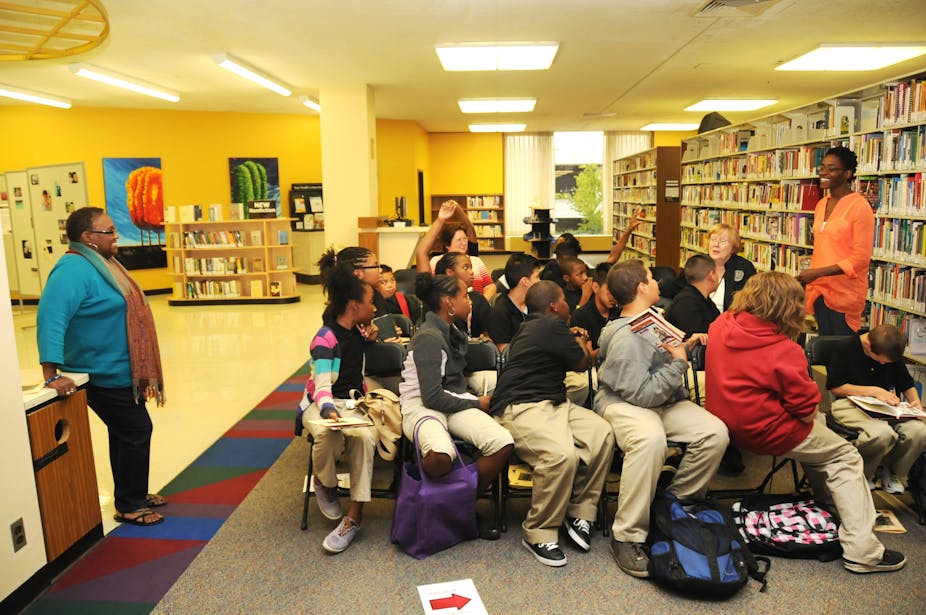In his 2005 book The Economy of Prestige, James F. English influentially argued that prizes thrive on scandal. Just last week, scholar Kathleen Horning claimed this year’s National Book Awards could change the face of children’s literature. They could both be right – but where does this leave the 2014 winners?
Jacqueline Woodson won the 2014 National Book Award for young people’s literature with her wonderful memoir, brown girl dreaming – but her win was overshadowed by a racist anecdote told at the ceremony.
Book awards act as miniature social contracts: some very smart, very knowledgeable people can spend all those hours many of us would like to have to read lots of books, and tell us which books we should really make time for. They will wade through thousands of pages of boring, irrelevant or poorly-written words, and they will find the literary pearls. After all, that’s why book awards are given for “excellence” or “literary merit”.
In practice, of course, nothing about book awards is so clear or so easy, as this year’s ceremony shows.
Excellence and literary merit are notoriously slippery concepts, and the politics of book awards often seem to be more obvious than the inherent value of prize-winning books. Even when a particular award is not seen to be partisan or politic, James F. English makes a convincing case that the main function of book awards is to generate publicity – preferably through scandal or controversy – and thus ensure the ongoing existence of the awards themselves.
Seen in this light, the 2014 National Book Awards may be one of the most successful book awards in recent history. As the bright-orange banner announcement which this week headed the US-based National Book Foundation’s website somewhat coyly says:
On Wednesday evening, November 19, 2014, at the National Book Awards, comments were made by the master of ceremonies which were entirely inappropriate, were not authorized by the National Book Foundation and which do not in any way represent the views of this organization. We regret the incident and apologize to all offended by the remarks, especially Jacqueline Woodson.
This statement illustrates a range of ongoing tensions around book awards, children’s literature, and diversity. Ironically, these tensions are revealed in their absence: you could read the NBF’s statement, and have no idea that diversity, cultural power, or the politics of race were factors at all.
For those not in the know, the “master of ceremonies” was Daniel Handler, a prolific and popular children’s writer, best known to millions of readers by his nom-de-plume, Lemony Snicket.
The “comments” which comprise the “incident” involve some truly awful language and ideas about African-American culture. I don’t want to reproduce them here, because they’re offensive. They were couched in an attitude of entitlement based on explicit assertions of cultural superiority and an implicit assumption about the right to speak from a position of power about disempowerment.
In short, the incident was white privilege on display.
It is perhaps because people who work with children’s literature have spent years thinking of Daniel Handler as an ally – for children’s books, for literacy, and for librarians – that the awfulness of the awards ceremony was such a shock. It is true that Handler has been, and will continue to be, a force for good in children’s literature, but now it may be by way of his full and frank admission of “monstrously inappropriate and yes, racist” remarks.
However one feels about Handler’s ensuing donations to the grassroots organisation WeNeedDiverseBooks (WNDB) as an act of redress, the money will be put to good use.
WNDB began, just this year, as part of a groundswell of visible, audible, shareable activism for diversity in children’s literature. As the name suggests, it seeks to promote “diverse, non-majority narratives in children’s literature”. I’ve made donations to the organisation myself.
Part of its activism is focused on resourcing diverse books for young people and, as such, WNDB includes links to several book awards on its website. WNDB reminds us, then, that book awards can be powerful tools for advocacy and social justice.
Sadly, in their understandable effort to address a spiralling situation, the National Book Foundation’s statement (above) may have missed its opportunity to be such a tool. What the statement doesn’t say is that Jacqueline Woodson’s gorgeous, powerful, and important work for readers of all ages, brown girl dreaming, not only exists, but won the 2014 National Book Award for Young People’s Literature.
If brown girl dreaming goes missing in this conversation, we are in a sad state of affairs. Woodson’s verse text is a powerhouse memoir. As it weaves memory, story, and history into a series of connected poems, one of the stories told by brown girl dreaming is of the challenges many young people face:
A moment when you walk into a room and/ no one there is like you.
Woodson’s book, then, reminds us that it would be a mistake to think that this is one pop-culture incident that can or should be forgotten. The long history of systemic racism which variously shaped brown girl dreaming and informed Handler’s comments continues to shape children’s literature and our culture as a whole.
As Lee and Low Books point out:
the joke may have been Handler’s, but the environment which made a joke like that permissible is everyone’s problem and responsibility.
Spend some time thinking about what you can do to challenge systemic racism, to acknowledge privilege (where you have it, and where you don’t), to state clearly that racism is unacceptable and to act accordingly. Donate to the WeNeedDiverseBooks campaign. Start asking your booksellers, your librarians and your teachers how they can help you diversify your reading habits.
But also, please read Woodson’s brown girl dreaming: it really is a wonderful book.

